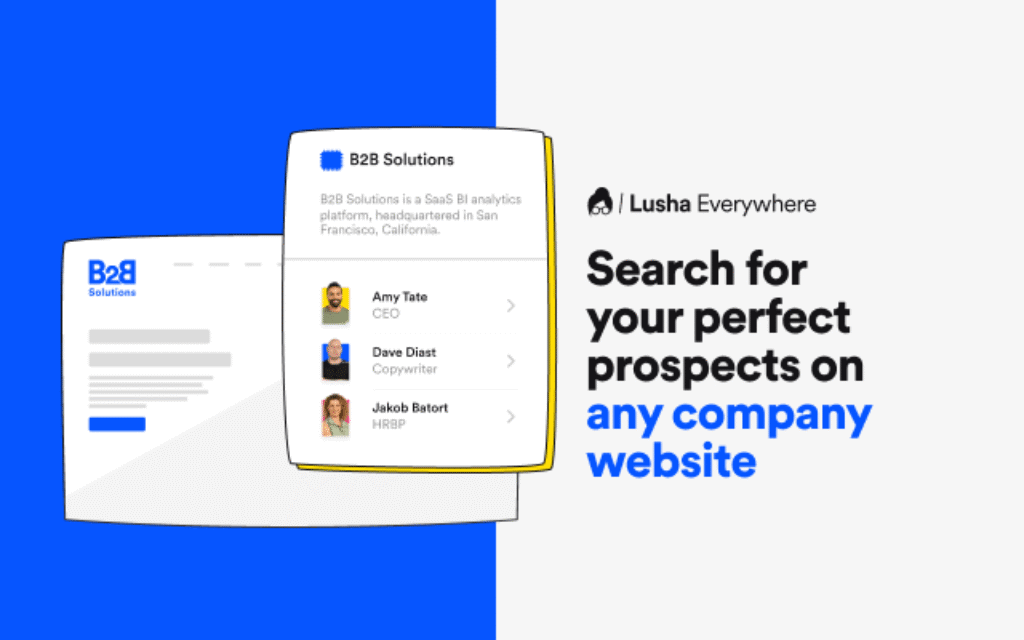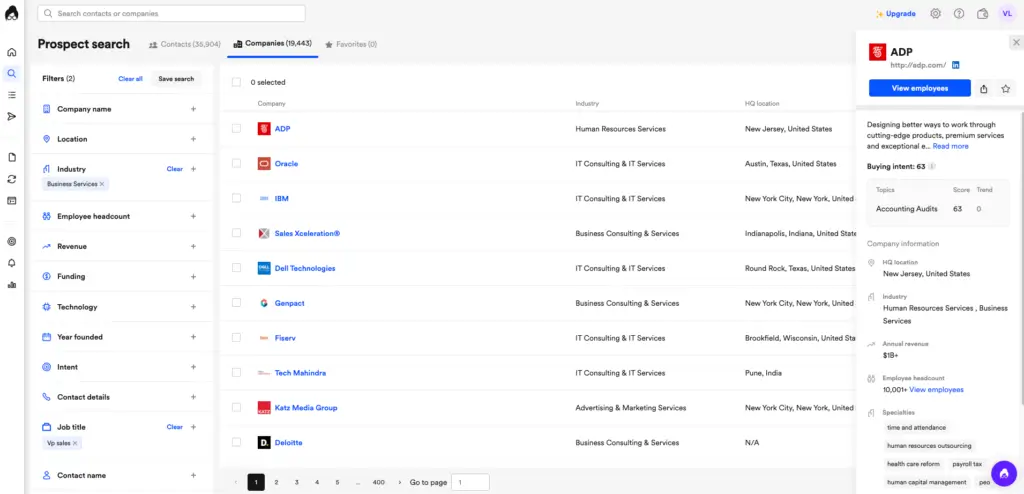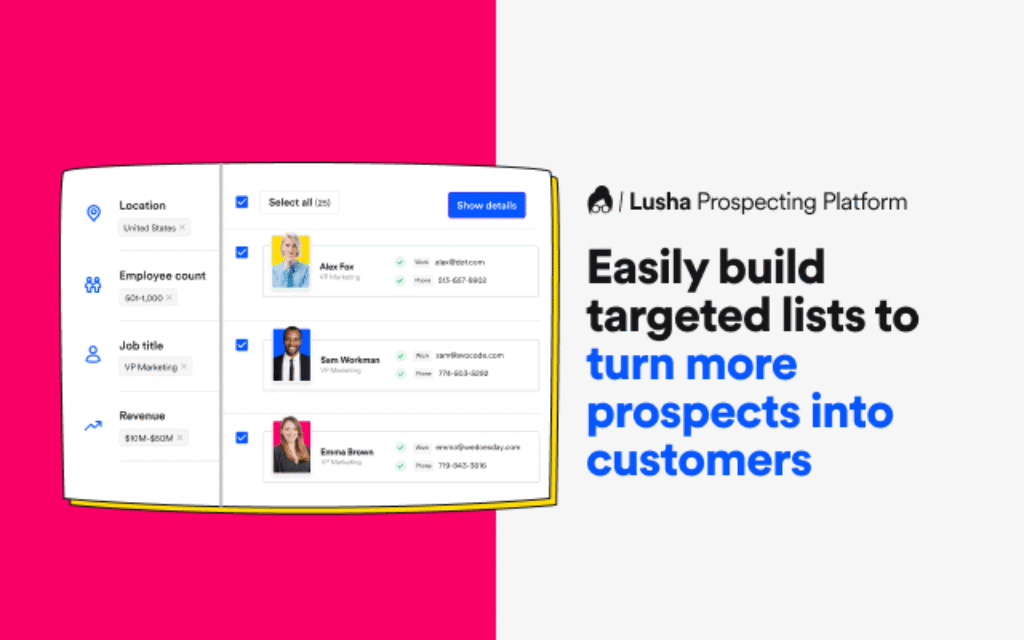Introduction
B2B sales and marketing depend on connecting with the right people at the right time. In a crowded digital marketplace, finding accurate contact information and enriching it with context can make or break a deal. You need data that’s both current and relevant so your team can focus on nurturing relationships rather than hunting for phone numbers and emails. That’s where data‑enrichment platforms come in.
What is Lusha?
Lusha is a B2B sales intelligence and contact enrichment platform designed to help sales, marketing, and recruiting teams find and verify contact and company data. Founded by Assaf Eisenstein and Yoni Tserruya, the tool began as a recruitment solution and has evolved into a robust lead generation platform. Today, you can use it via a web interface, browser extension, or API to collect verified emails and phone numbers, enrich CRM records, and identify decision‑makers faster. The platform integrates with popular CRMs like Salesforce and HubSpot, supports GDPR and CCPA compliance, and offers AI‑powered recommendations to help you prioritize high‑value leads.
Accurate contact information isn’t the only advantage. Lusha also provides advanced search filters, intent data signals, and buyer intelligence so you can build targeted lists based on industry, company size, technographics, job changes, or funding rounds. Its scalability makes it suitable for startups seeking a few quality leads or large enterprises looking to enrich thousands of contacts per day.
Key Features
Lusha‘s Software Specification
Data Enrichment & Accuracy
Lusha’s data enrichment engine is its core value proposition. When you upload or search for contacts, the platform cross‑references multiple data sources to fill in missing details such as business emails, direct phone numbers, job titles, and company information. Verified contact details help reduce bounce rates and increase the chances of reaching the right person. According to Lusha and third‑party reviews, email accuracy typically reaches around 90%, while phone numbers hover around 80–85%. You should still cross‑check critical records, but the platform’s continual updates and double‑verification processes mean you spend less time manually researching prospects.
Beyond individual contact data, Lusha offers company insights. You can view details like company size, industry, headquarters, funding rounds, and technographics. These insights help qualify leads and tailor messaging.
Prospecting & Lead Generation Tools
Lusha’s prospecting module lets you search for leads based on criteria such as job title, seniority, location, industry, or technologies used. Advanced filters and Boolean search options allow for precise targeting. Intent data highlights companies actively searching for solutions similar to yours, helping you prioritize high‑potential leads.
Key prospecting features include:
- Targeted search: Filter prospects by industry, company size, revenue, or job role to build focused lists quickly.
- Bulk enrichment: Upload a CSV of incomplete contacts and enrich hundreds of records at once, saving hours of manual work.
- Buyer intelligence: Use intent signals and technographic filters to identify accounts showing buying activity and tailor your outreach accordingly.
Browser Extension & CRM Integrations
A standout feature is Lusha’s Chrome (and Firefox) extension. As you browse LinkedIn profiles or company websites, you can click the extension to reveal hidden contact details on demand. This real‑time enrichment eliminates the need for separate searches and reduces data entry. The extension also supports bulk reveals, allowing you to unlock multiple contacts from a single company page.
Integrations are available for leading CRMs and marketing automation platforms such as Salesforce, HubSpot, Zoho, Pipedrive, Pardot, Marketo, and Gmail. These integrations let you push enriched contacts directly into your pipeline or enrich existing records without leaving your CRM. For developers, the REST API enables you to embed Lusha’s data into your own applications or automate enrichment workflows.
Intent Data & AI‑Driven Recommendations
With the increasing role of AI in sales intelligence, Lusha incorporates machine learning to deliver personalized suggestions. The platform analyzes its vast database, user behavior, and intent signals to recommend accounts or contacts that fit your ideal customer profile. It can surface companies experiencing job changes, new funding rounds, or technology adoption, helping you engage at optimal moments. AI‑generated insights also extend to recommended search terms and playlists for prospects, ensuring that you don’t overlook hidden opportunities.
User‑Friendly Interface and Workflow Automation
Even sophisticated tools should be simple to use. Lusha’s web interface is clean and intuitive, featuring clear navigation, responsive design, and consistent layouts across devices. You can move from prospect search to enrichment to export with minimal clicks. A centralized dashboard displays credit usage, recent searches, and integrations at a glance. Bulk actions, such as CSV enrichment or mass contact reveals, streamline tasks that would normally take hours.
Workflow automation is also built into the platform. For example, you can set up triggers to enrich CRM records when they meet certain criteria or schedule periodic refreshes so your data remains current. These automations free your team from manual updates and reduce the risk of outdated information.

Pros and Cons
Benefits and Limitations of Using Lusha
Positive
✅ User‑friendly interface
✅ Accurate data
✅ Time‑saving tools
✅ Intent data and AI insights
Negative
❌ Limited free credits
❌ Higher costs for advanced features
❌ Data coverage gaps
❌ Dependency on external platforms
✅ Pros
Lusha has several advantages that appeal to sales, marketing, and recruiting teams:
- User‑friendly interface: The platform is simple to navigate, reducing the learning curve and helping your team adopt the tool quickly.
- Accurate data: Verified emails and phone numbers increase your success rate when reaching out to prospects.
- Time‑saving tools: The browser extension, bulk enrichment, and CRM integrations speed up research and minimize manual data entry.
- Intent data and AI insights: Built‑in signals and recommendations help prioritize high‑potential leads and optimize outreach timing.
- Scalable plans: Flexible tiers and credit pools accommodate startups through enterprise teams.
- Compliance measures: Adherence to GDPR and CCPA provides peace of mind when handling personal data.
❌ Cons
No tool is without drawbacks. Consider the following limitations when evaluating Lusha:
- Limited free credits: The Free plan’s credit cap restricts usage and can frustrate active users.
- Higher costs for advanced features: Premium and Custom plans can be expensive for small businesses, especially if credits go unused.
- Data coverage gaps: Although data accuracy is generally good, you may encounter outdated or missing information for niche industries or smaller companies.
- Dependency on external platforms: The platform relies heavily on LinkedIn and other sources; changes to these platforms’ policies can impact your workflow.
- Scalability concerns: Large teams must monitor credit usage carefully to avoid running out. Integrating Lusha into complex tech stacks may require extra setup.
User Experience
User Experience and Ease of Use
Interface and Navigation
Lusha’s interface emphasizes simplicity. The main dashboard offers quick links to prospects, lists, and enrichment tools. Search bars and filters are prominently displayed, making it easy to build or refine lists without clicking through deep menus. Each page is designed with minimal clutter, so you can focus on the data without distractions. The responsive layout works well on desktops, tablets, and smartphones, meaning you can access important contacts from any device.
Workflow & Automation Tools
You’ll appreciate how Lusha automates repetitive tasks. For example, bulk CSV enrichment lets you upload spreadsheets and receive enriched contacts in minutes. The shared credit pool in multi‑seat accounts prevents individual users from running out of credits. Webhooks and API endpoints can trigger updates or push new data to your CRM automatically. You can also schedule periodic enrichment to refresh stale records, ensuring your database stays current without manual intervention.
Customer Support & Resources
Lusha provides several support channels: email support is available to all users, while phone support is reserved for premium plans. A chatbot on the website can handle basic queries and direct you to detailed help center articles. The knowledge base includes tutorials, webinars, and getting‑started guides that walk you through tasks like installing the browser extension or configuring CRM integrations. Some users report that response times vary, so if you expect high‑priority support, consider a higher‑tier plan. Community forums and webinars are also valuable for discovering best practices from other Lusha users.

Data and Security
Data Accuracy, Privacy, and Compliance
Accuracy Rates and Data Quality
As with any data provider, accuracy can fluctuate by region, industry, and data source. Lusha claims email accuracy around 90% and phone accuracy between 80–85%. Reviews on marketplaces like G2 and Software Advice corroborate that the platform generally delivers reliable contact information, although occasional inaccuracies exist, particularly for niche industries or smaller companies. To maximize accuracy, pair Lusha with additional verification tools or cross‑reference critical contacts using internal research.
Privacy Regulations & Compliance
Lusha states that it complies with major data privacy regulations, including the GDPR for European users and the CCPA for Californians. This compliance involves providing transparency on how data is collected, stored, and used. Lusha only shares publicly available information or data obtained with consent. Users can configure compliance rules within the platform to align with their internal policies and restrict access to certain data fields. The platform also offers a data removal process so individuals can opt out if they wish.
Security Measures
Security is built into Lusha’s infrastructure. Data is encrypted both in transit and at rest, and regular audits help ensure systems remain secure. The company employs secure servers, multi‑factor authentication, and strict access controls to mitigate the risk of unauthorized access. Enterprise plans include advanced security features such as SSO integration and dedicated account management to help you meet corporate IT requirements.
Pricing and Plans
How much does Lusha cost?
Overview of Free, Pro, Premium, and Custom Plans
Lusha offers tiered plans to suit different team sizes and budgets. Pricing is based on monthly or annual billing, and the number of credits determines how many contacts you can reveal or enrich.
-
Free plan: Includes around 50 credits per month (600 per year) and one seat. You get email and phone reveals, basic bulk reveal (up to 25 contacts), a limited number of intent topics, standard filters, and integrations with popular CRMs. This plan is ideal for individual users wanting to test the platform or those with minimal data needs.
-
Pro plan: Priced at roughly $22.45 per month when billed annually, offering about 3,600 credits per year and three seats. It includes everything in the Free plan plus more bulk reveals, CSV enrichment up to 300 rows, basic usage analytics, job change alerts, advanced filters, API access, and a shared credit pool.
-
Premium plan: Around $52.45 per month (annual billing) with approximately 7,200 credits per year and five seats. In addition to Pro features, you gain larger CSV enrichment (500 rows), advanced analytics, and greater bulk reveal limits (150 contacts). It’s designed for growing teams that need deeper insights and more flexibility.
-
Custom or Enterprise plan: Offers customizable pricing and credit allotments. This tier includes everything in Premium plus dedicated account management, company CSV exports, high‑volume bulk shows (up to thousands of contacts), advanced security features, single sign‑on (SSO), CRM enrichment services, and priority support. It’s tailored for large organizations with complex workflows.
Value for Money and Promotions
The per‑credit cost of each plan decreases as you move up tiers, so teams with higher usage often find better value in Premium or Custom plans. Lusha frequently offers promotions such as percentage discounts or bonus credits when you sign an annual contract. Keep an eye on the company’s official site for seasonal deals or bundle offers, which can significantly lower your cost of ownership.
Considerations for Small vs. Large Teams
Small teams or individual professionals may find the Free plan sufficient for occasional prospecting. However, limited credits and restricted features can become a bottleneck if you have aggressive outreach goals. Paid plans unlock higher credit pools, enriched data exports, and the ability to collaborate with teammates. Larger teams should consider the Premium or Custom tiers to avoid credit scarcity and to access advanced analytics, which can justify the higher investment by boosting conversion rates.
Lusha Pricing Compared to Competitors
| Plan Type | Lusha | ZoomInfo | RocketReach |
| Free Plan | 5 credits/month | Not available | 5 lookups/day |
| Starter Plan | $39/user/month (120 credits) | Starts at $14,995/year | $53/month (1,200 lookups/year) |
| Professional Plan | $69/user/month (480 credits) | Custom pricing only | $107/month (3,000 lookups/year) |
| Enterprise Plan | Custom quote with team analytics & API access | Custom quote, advanced intent data | Custom quote with CRM integrations |
| Data Accuracy | 90% email, 80% phone | 92% verified contacts | 88% verified contacts |
| Integrations | Salesforce, HubSpot, Pipedrive, Outreach | Salesforce, HubSpot, Marketo | Salesforce, Zapier, HubSpot |
| Best for | Small to mid-sized sales teams | Large enterprises with complex data needs | Recruiters and freelancers |
Competition
Lusha Alternatives and Competitors
Overview of Alternatives
If Lusha doesn’t fully meet your needs, several other sales intelligence tools offer comparable or complementary features. Here’s a quick rundown of popular alternatives:
-
ZoomInfo: Offers an extensive database with advanced search filters and deeper company insights, but comes at a higher price point. Ideal for enterprises seeking comprehensive coverage.
-
Apollo.io: Combines contact data with sales engagement features, including automated sequences and dialer tools. It’s cost‑effective for startups seeking an all‑in‑one solution.
-
Clearbit: Focuses on marketing data enrichment rather than direct prospecting. Useful if you need to refine website forms, personalize campaigns, or feed accurate data into analytics tools.
-
RocketReach: Provides a mobile app, AI‑enhanced search, and a database boasting around 95% email accuracy and 85% phone accuracy. It’s a strong contender if on‑the‑go access and accuracy are top priorities.
-
UpLead: Offers high data accuracy (around 95%) and technographic filters. It’s known for transparent pricing and a pay‑as‑you‑go model, making it attractive for small teams.
Comparison Table
Below is an HTML table comparing Lusha with two popular competitors. Use this table to quickly assess feature differences and potential trade‑offs.
| Feature Type | Lusha | RocketReach | ZoomInfo |
| Data Accuracy | ~90% email, 80–85% phone | 95% email, 85% phone | High but varies by plan |
| Free Credits | 50/month (600/year) | 10/month | No free plan |
| AI Recommendations | Included on most plans | Limited AI guidance | Advanced predictive insights |
| Mobile App | None (web optimized) | iOS & Android app | Limited mobile access |
| Pricing Starting At | Free; paid plans from ~$22/month | $49/month | Starts around $79/month |
| CRM Integrations | Salesforce, HubSpot, Pipedrive, Zoho | Salesforce, HubSpot, Marketo | Salesforce, HubSpot, Marketo, Pardot |
When comparing alternatives, consider factors like data accuracy, pricing, available credits, engagement features, and mobile support. If your team values ease of use and intends to do most prospecting on LinkedIn, Lusha’s browser extension may be sufficient. For larger teams needing deeper analytics, ZoomInfo might be worth the higher cost.
Best Practices
How to Use Lusha Effectively
Step‑by‑Step Guide
- Sign up and choose a plan: Create a Lusha account and select a plan that matches your credit needs. If you’re unsure, start with the Free plan and upgrade later.
- Install the browser extension: Add the Chrome or Firefox extension. Once installed, you can reveal hidden contact details while browsing LinkedIn or company websites.
- Search for prospects: Use Lusha’s search tool to filter leads by industry, company size, job title, geography, or technologies. Save promising contacts to a list.
- Reveal and enrich contacts: Click the Lusha icon to reveal email addresses and phone numbers. For larger lists, upload a CSV file and run a bulk enrichment.
- Export to your CRM: Connect your CRM, such as Salesforce or HubSpot, and push enriched contacts directly into your pipeline. Configure auto‑enrichment rules to keep records fresh.
- Use intent data and alerts: Activate intent signals and job change alerts to discover companies actively looking for solutions like yours. Prioritize outreach to these hot leads.
- Monitor credit usage: Track your remaining credits and schedule top‑ups if your team is approaching the limit. Shared pools help distribute credits among team members.
Best Practices & Strategies
- Segment your lists: Organize contacts into lists based on buyer persona or industry. This allows you to craft personalized outreach sequences.
- Verify key contacts: For high‑value prospects, use secondary tools or cross‑check via LinkedIn to confirm the accuracy of emails and phone numbers.
- Leverage integrations: Integrate Lusha with marketing automation platforms to trigger follow‑up sequences or lead scoring workflows. This ensures no lead falls through the cracks.
- Stay compliant: Configure data privacy settings and ensure your outreach adheres to regulations. Provide opt‑out links in your communications and honor removal requests.
Real Use Cases & Success Stories
Companies across various industries have reported tangible benefits from using Lusha. A mid‑sized marketing agency, for example, replaced manual research with automated enrichment and achieved a 30% increase in conversion rates by focusing only on verified contacts. A technology firm used intent signals to identify companies seeking solutions in their space and shortened the sales cycle by targeting prospects right when they were most receptive. Recruiting teams have also used the platform to find candidates faster by filtering by role and location and then revealing contact details with a single click.

Conclusion
Final thoughts
Summary of Benefits and Considerations
Lusha is a powerful B2B lead generation tool that delivers accurate contact information, intuitive workflows, and scalable pricing. The platform’s browser extension and integration capabilities make it easy to enrich your CRM without leaving your workflow. AI‑driven intent data and recommendations help you focus on high‑potential leads, while compliance measures ensure data privacy.
However, the tool isn’t perfect. Limited free credits, occasional data gaps, and higher costs for premium features can be barriers for small teams. Data accuracy varies across regions and industries, and the platform’s dependency on external sources may lead to inconsistencies.
Who Should Use Lusha
Lusha is best suited for sales, marketing, and recruiting professionals who need a straightforward way to find verified contact information and enrich their pipelines quickly. Startups and small businesses can start with the free plan to test the waters, while growing teams may opt for Pro or Premium plans to unlock more credits and advanced analytics. Enterprises with complex workflows should consider the Custom plan for dedicated support and high‑volume enrichment.
Future of Lusha & AI Trends
Sales intelligence is rapidly evolving as artificial intelligence and machine learning play larger roles. Lusha is investing in these areas, with AI‑driven recommendations already available in its platform. In the future, expect more predictive insights to surface automatically, such as identifying when a company is likely to raise funding or expand to a new market. Enhanced natural language search may allow you to ask questions like “Find IT directors in SaaS companies with recent funding” and receive curated lists instantly. Additionally, data enrichment will become more real‑time, pulling from up‑to‑the‑minute sources to keep your CRM perpetually current.
Final Thoughts
Choosing the right lead generation tool is about balancing accuracy, usability, and budget. If your priority is quick access to verified emails and phone numbers without a steep learning curve, Lusha provides a compelling solution. Its robust features, AI enhancements, and flexible pricing make it a strong contender in the sales intelligence market. Just remember to supplement it with additional verification and to evaluate alternatives if you need deeper analytics or broader data coverage. With the right strategy, Lusha can help you build and nurture relationships that drive sustainable growth.
FAQs
Frequently Asked Questions
What is Lusha used for?
Lusha helps sales, marketing, and recruiting teams find verified contact and company information so you can connect with decision‑makers and enrich your CRM.
How accurate is Lusha’s data?
Lusha claims email accuracy around 90% and phone accuracy between 80–85%. Accuracy may vary by industry or region, so it’s best to verify critical contacts.
Does Lusha offer a free plan?
Yes, Lusha provides a free plan with limited credits, basic contact reveals, and standard features. You can upgrade to paid plans for more credits and advanced tools.
How does Lusha integrate with my CRM?
Lusha connects to CRMs like Salesforce, HubSpot, Zoho, and Pipedrive. You can push enriched contacts directly into your pipeline or set up auto‑enrichment to keep records updated.
Can I use Lusha for recruiting?
Absolutely. Originally built for recruitment, Lusha helps recruiters find verified candidate information, filter by job role, and reach candidates via direct emails or phone numbers.
Is Lusha GDPR and CCPA compliant?
Lusha states that it complies with major privacy regulations, including GDPR and CCPA. It provides transparency on data usage and allows data subjects to request removal.
What happens when I run out of credits?
Your ability to reveal or enrich contacts pauses until the next billing cycle or until you purchase additional credits. Premium plans offer larger pools, and enterprise plans provide custom credit allowances.
Does Lusha have a mobile app?
Lusha does not currently offer a dedicated mobile app. However, its web interface is mobile‑optimized, allowing you to access key features from a smartphone or tablet.
How does Lusha differ from ZoomInfo?
Lusha focuses on ease of use, accurate contact data, and a lightweight browser extension. ZoomInfo offers deeper company insights, a larger database, and predictive analytics but at a higher price point.
Is Lusha worth the cost?
If you need accurate, verified contact data and seamless CRM integration, Lusha can provide a strong return on investment. Small teams benefit from its simplicity, while larger teams may require premium plans for sufficient credits.








